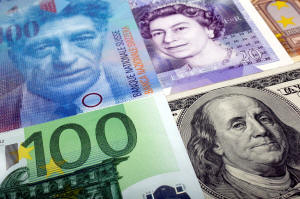Battered euro hits lowest since 2016 vs sterling, oil surge bites
 Send a link to a friend
Send a link to a friend
 [March 03, 2022] By
Dhara Ranasinghe [March 03, 2022] By
Dhara Ranasinghe
LONDON (Reuters) - The euro slid to its
lowest level in almost six years against Britain's pound and was pinned
near 21-month lows versus the dollar on Thursday, as a fresh surge in
energy prices heightened worries about the euro area economic outlook.
With Brent crude hitting a nine-year high above $119 per barrel, a dash
for resources bolstered commodity-linked currencies. Australia's dollar
briefly touched its highest since November.
But it was the euro that took the spotlight as it fell to 82.76 pence in
London trade. That was the lowest level against sterling since July
2016.
The single currency was down 0.3% at $1.1086, holding near Wednesday's
low of $1.1058, its lowest since May 2020. It is down 1.6% so far this
week and is heading for a fourth consecutive weekly loss against the
U.S. dollar.
"It's still going down," said Kit Juckes, chief global currency
strategist at Societe Generale in London, referring to the euro. "Look
at gas prices. This is the clinch point in terms of the economic impact
of the war, and it is going to hurt."

Graphic: The euro and gas prices:
https://fingfx.thomsonreuters.com
/gfx/mkt/lgvdwajqdpo/euro0303.PNG
Euro zone inflation hit a record high of 5.8% last month, data on
Wednesday showed. The problem for the European Central Bank, which meets
next week, is that while the war in Ukraine is likely to boost inflation
further, it is a negative for both growth and inflation in the longer
term.
The Australian dollar rose to its highest since mid-November at $0.7323
as prices for Australian exports such as coal, gas and grains soar on
signs that sanctions against Russia are severely disrupting global
supplies.
But it drifted lower as the session wore on and was last at $0.7298,
just marginally higher on the day.
[to top of second column] |

A picture illustration of U.S. dollar, Swiss Franc, British pound
and Euro bank notes, taken in Warsaw January 26, 2011. REUTERS/Kacper
Pempel/File Photo

"Soaring commodity prices means commodity-focused currencies not directly linked
to the escalating geopolitical tensions like the Aussie and the Kiwi are doing
well," said Aaron Hurd, senior portfolio manager for currency, at State Street
Global Advisors.
The U.S. dollar appeared well-supported after Federal Reserve Chair Jerome
Powell said on Wednesday the central bank would begin "carefully" raising
interest rates this month, but was ready to move more aggressively if needed.
The dollar index was up 0.2% and the dollar itself was 0.2% firmer at 115.74
yen, while sterling slipped 0.3% to $1.3364.
Canada's dollar, meanwhile touched a five-week high of C$1.25870 per dollar, a
day after the Bank of Canada's first interest rate hike since 2018.
Elsewhere, the Russian rouble slid to a fresh record low at around 118.35 in
Moscow trade after ratings agencies Fitch and Moody's downgraded Russia to
"junk" status, citing the impact of Western sanctions.
Hungary's forint was weaker but holding below Wednesday's record lows against
the euro as the country's central bank raised its one-week deposit rate NBHK by
75 basis points to 5.35% at a weekly tender on Thursday. That was the biggest
rate hike since 2008 as the war in Ukraine roiled Hungarian markets.
Bitcoin edged down around 1% at $43,466 as an early-week bounce lost steam.
(Reporting by Dhara Ranasinghe; Additional reporting by Tom Westbrook in
SINGAPORE and Saikat Chatterjee in LONDON; Editing by Hugh Lawson and Edmund
Blair)
[© 2022 Thomson Reuters. All rights
reserved.]This material may not be published,
broadcast, rewritten or redistributed.
Thompson Reuters is solely responsible for this content. |